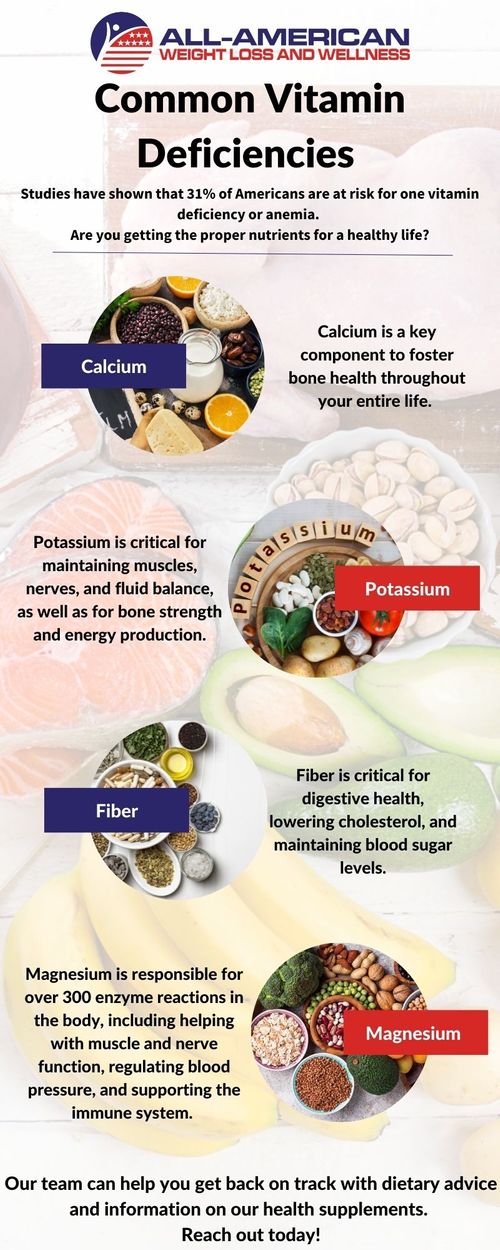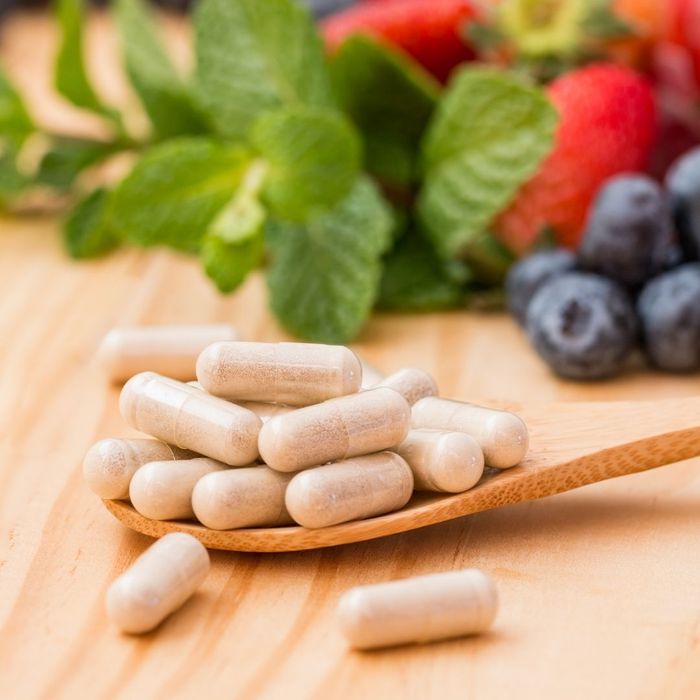Maintaining a healthy weight can be challenging, especially if you are not getting the right nutrition. Many Americans do not follow a healthy diet, cutting many important nutrients out of their daily intake, and leaving them susceptible to many chronic diseases including type 2 diabetes, cardiovascular disease, osteoporosis, and other preventable diseases. While other factors can contribute to your health, studies have shown that 31% of the U.S. population was at risk of at least one vitamin deficiency or anemia. At All-American Weight Loss and Wellness, we believe in creating a weight loss program tailored to your individual goals and health needs. Our entire team is dedicated to helping you feel your best with our medical expertise and knowledgeable advice. Keep reading to learn more about the most common vitamin deficiencies and how nutritional supplements can help you achieve your overall health goals.
Common Things That Could Be Missing From Your Diet (And Their Benefits)
Common Things That Could Be Missing From Your Diet (And Their Benefits)


Calcium
While many of us were surrounded by the “Drink Milk” campaign growing up, many American adults do not get enough calcium in their daily diet to support their nutritional needs. Calcium is very important for your bone health throughout your life, especially as you get older. According to the National Academy of Medicine (formerly known as the Institute of Medicine), this is how much calcium you need daily:
Ages 19 to 50: 1,000 milligrams
Ages 51 and up: 1,200 mg
Examples of foods you can eat to increase your calcium intake include:
Nonfat Milk or Nonfat Plain Yogurt
Calcium-fortified Orange Juice
Cheese
Calcium-fortified Soy Milk, Almond Milk, or Another Milk Alternative
You can also schedule a free consultation with one of our All-American Weight Loss and Wellness professionals to discuss calcium health supplements.

Potassium
Potassium is critical for maintaining muscles, nerves, and fluid balance, as well as for bone strength and energy production. The intake amounts of potassium are the same for both men and women over the age of 19: 4,700 milligrams of potassium intake per day. Examples of potassium-rich foods include:
Kidney Beans
Raw Spinach
Sweet Potatoes
Greek Yogurt
Orange Juice
Cooked Broccoli
Cantaloupe
Bananas
If you find yourself lacking in potassium, nutritional supplements can be added to your diet to meet the necessary intake.

Fiber
Fiber plays a big role in digestion. Constipation is one of the most common signs of fiber deficiency. This nutrient is not only good for your digestive system, but it also contributes to lower cholesterol and blood sugar levels, decreasing your risk of heart disease. The National Academy of Medicine has defined the following fiber nutrient standards:
Men ages 19 to 50: 38 grams; ages 51 years and older: 30 grams
Women ages 19 to 50: 25 grams; ages 51 years and older: 21 grams
Examples of fiber-rich foods include:
Whole Grain Cereals
Fruits and Vegetables
Nuts and Seeds
Chickpeas
Eggs
Popcorn
When increasing your fiber intake with nutrient-rich foods and fiber health supplements, it is important to remember to stay hydrated to promote overall gut health and medical weight loss.

Magnesium
Magnesium is a much-needed nutrient, affecting over 300 enzyme reactions in the body performing many functions including helping with muscle and nerve function, regulating blood pressure, and supporting the immune system. Adults who have a magnesium deficiency are more likely to have increased inflammation that is associated with chronic health issues like heart disease, diabetes, and even certain cancers. The recommended dietary intake for people ages 19-51+ is:
Men: 400-420 mg
Women: 310-320mg
Some magnesium-rich foods include:
Green, Leafy Vegetables, Like Spinach
Nuts
Beans, Peas, and Soybeans
Whole-Grain Cereals
Making an appointment with an All-American Weight Loss and Wellness medical professional can help ensure you are getting the right amount of magnesium in your daily diet.
Nutrient Support from All-American Weight Loss and Wellness
Don’t let vitamin deficiencies take a toll on your overall health or weight loss journey. Schedule an appointment with one of our health professionals today to learn if you are lacking any essential vitamins or minerals. Our team can help you get back on track with dietary advice and information on our health supplements. Reach out today!
